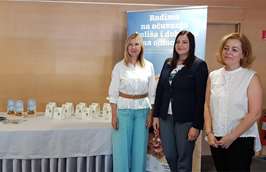12.07.2022.
Results of the pilot project “Reduce food waste, cook for your guests” were presented at the press conference in Osijek Hotel.The Fund implemented the pilot project in the past year in collaboration with the Ministry of Economy and Sustainable Development and the Ministry of Tourism and Sports.
The aim of the pilot was to establish whether it was possible to achieve savings in hotel kitchens and reduce food waste. Two hotels were chosen for the trial – one in Osijek and one in Pula, and the results of project implementation at the Hotel Osijek were presented at today’s press conference.
“We are extremely satisfied with the outcomes and the commitment of all stakeholders. Although we set out with this pilot project a bit hesitantly in only two hotels, during the year it was proved that our ideas and goals have been recognised, especially in the context for the ever-growing demands for prudent waste management,” said the head of the department at the Fund and pilot project coordinator Vesna Cetin Krnjević.
The most represented categories of food waste do not differ much from European studies – mostly pasta, bread and cereal products. “At Osijek Hotel we established there are significant quantities of waste from bread, and we’re glad this motivated the management to change the bread standard portion size, which resulted in a reduction in bread waste by as much as 50%,” underlined Cetin Krnjević.
Hotels had to become aware that apart from educating hotel staff and changing their work methods, they had to change their communication with guests. “The guests’ habits during the consumption of food are also important because guests determine the quantity of food they will plate since it is mainly served buffet-style, and it often happens that they take more than they can actually eat. So, it is vital to become aware of the problem of discarding leftover food. Conveying the message to the guests in an unobtrusive manner that they should fill their plates with only as much as they can eat was a success, first by offering smaller plates, and with messages on small tent cards that are now a standard feature on our tables,” explained Sandra Đurđević, Osijek Hotel manager.
The hotel sector as one of the most important stakeholders in tourism has a significant impact on the environment, so the transition to the green business model is a must. “This pilot project has sparked the interest of other hotels that are reaching out to us, something which we’re thrilled by because this will help reduce food waste, which is biowaste we’re still landfilling and it has a significant environmental impact, primarily on ground and surface waters, soil, air and greenhouse gas emissions. This means we’re acting economically and ecologically. It is an environmental project with a future, and the one we are very proud of,” said the head of the sector at the Fund Maja Feketić.
In mid-June, the Fund published a Public Call for co-financing the purchase of biodigesters for hotels. The value of the call is HRK 1.5. million, and hotels can get up to 40% of co-financing for eligible cots, or the maximum of HRK 150,000.
The Osijek Hotel showed first hand that savings are possible and that other hotels in Croatia, too, can introduce significant improvements by applying food waste reduction methods. That is why the project will continue in other hotels in Croatia, and over time in other institutions with large kitchens.












